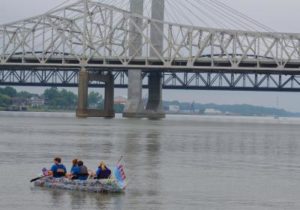 Students at Louisville Male High School found an innovative way to teach the world a lesson on cleaning up the environment by building a boat made of empty plastic water bottles.
Students at Louisville Male High School found an innovative way to teach the world a lesson on cleaning up the environment by building a boat made of empty plastic water bottles.
Ecology teacher Angela Page said Juniors Katie Norman, Haley Pucek and David Jones make up the Stopping Real World Waste team to educate others about pollution and the environment.
“I allow students to direct their own learning. This is an elective course and I feel very lucky to have permission to go off campus and do real-world work. It’s OK to learn from a book but to build a boat and actually go out and talk to people is more powerful,” Page said.
Katie Norman, the team captain, said she got the idea to build the boat one day during class when she was getting water samples from Beargrass Creek.
“I noticed these large formations of plastic water bottles. When I came back to school, I realized that if I don’t do something, who will?” Norman said.
After tossing around a few ideas on how to solve the waste issue, Norman came up with the idea to build the boat.
“It just hit me. I could build a boat out of water bottles,” Norman said. “I talked to Ms. Page and I got a group of friends together. We started diving into different ideas on whether to use glue or duct tape. We realized not many people have done this and there was nothing to go off of.”
Before building the boat, the students needed lots of bottles. They collected thousands of water bottles from other students at Male.
Even in the collection process, Norman said she learned a valuable lesson on how waste impacts our environment.
“Our school has a rough population of 2,000 students and staff. Between February and early June, we collected more than 3,000 water bottles. If we’re producing that much (waste) from such a small school, how much is the city of Louisville producing and how much are we contributing to the waste around the world?”
After collecting the bottles, the team began tackling the larger task of building the boat. At first, their strategy was mainly trial and error.
“We started out with glue which was a horrible mistake. It didn’t hold well and it was just a mess,” she said. “Then we tried duct tape. We wanted to see if it would hold overnight and if it would hold up in water.”
Haley Pucek said her main role was to help with the actual layout of the bottles to form the boat.
“We stayed after school for two or three hours almost every day and we met on the weekends down at the boathouse working to put it together,” Pucek said.
David Jones said he used what he learned in math and physics classes to figure out the design of the boat.
“We figured out that one bottle could support two pounds of weight. Then we estimated how many bottles to use to build the boat,” Jones said.
The duct tape passed the water test, but the team wasn’t sure if the tape would be enough to support their weight in the boat. After several tries, they found the perfect tool.
“We grabbed some zip ties and started looping them through the water bottles,” Norman said.
Would a boat made solely of duct tape, empty water bottles and zip ties float? There was only one way to find out.
“I’ve always been told to ‘Go big or go home.’ We grabbed our life jackets and our paddles and threw it down the Ohio (river),” Norman said. “We went from the boathouse near River Road and we made it down to the Waterfront (Park) and participated in the Mayor’s Hike, Bike and Paddle. The boat holds very well.”
Page said she had no doubt that the students would reach their goal.
“The moment that we put the boat in the water and it actually floated, they were in awe. Just seeing their faces and seeing their relief was a moment I will take with me forever,” Page said. “You could see in their faces they were just so proud. That was my moment.”
The boat also caught the attention of Louisville Metro Councilman Bill Hollander who serves the district near Louisville Water’s Crescent Hill Treatment Plant and Reservoir. He tweeted a picture of the students in the boat during the event.
Pucek said the extra attention could help drive the team’s cause.
“Maybe this will open eyes to how big of a problem (waste) is and how people can make a change in the environment,” said Pucek. “It’s definitely changed my perspective.”
Norman said it felt good to successfully float down the river in the bottle boat but she doesn’t want to lose sight of the bigger picture: eliminating excessive waste.
“We can really eliminate a lot of this plastic,” she said. “If we don’t, what are our grandchildren and their children going to be looking at? How are they going to be living? How long will the earth last?”
Building the boat has helped change her classmates’ mindsets on plastic bottle waste.
“This was really a group effort and the boat has really been a life changer. We want to reach a generation of people who can take this information, run with it and make this their own.”

